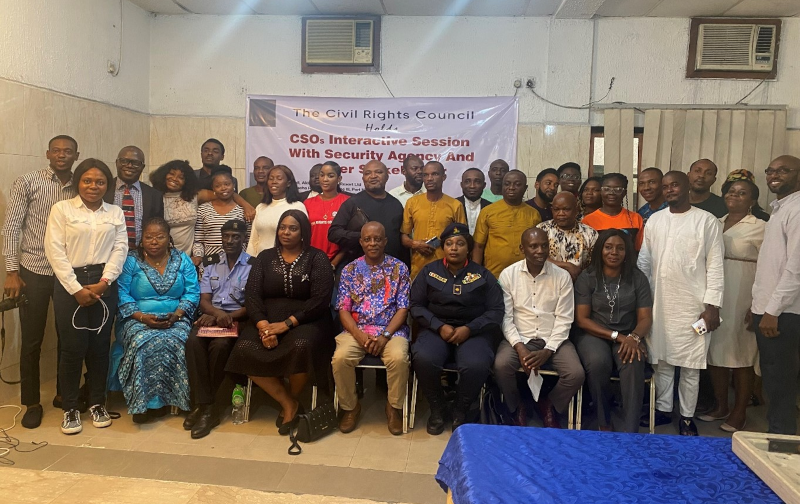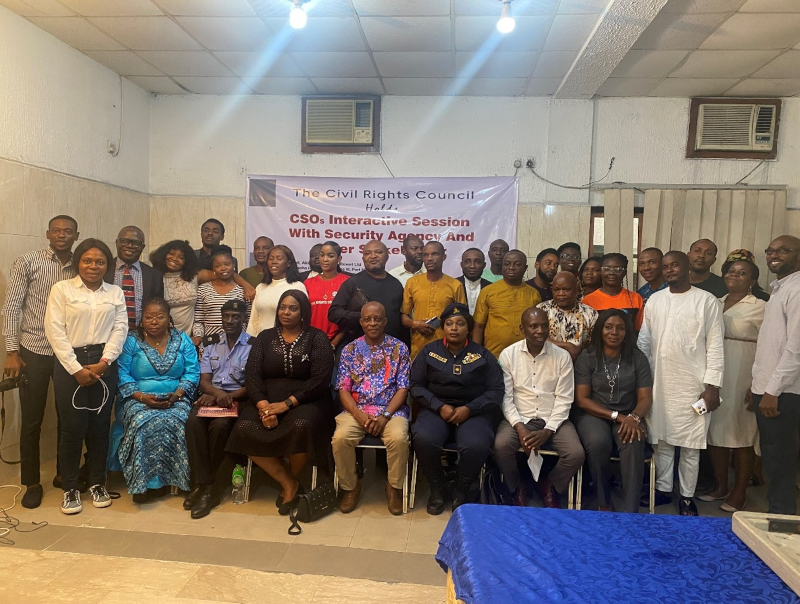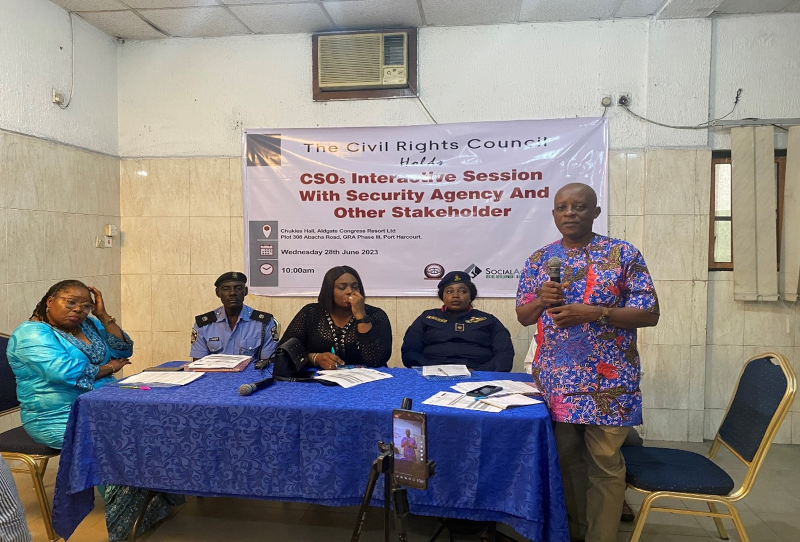
SECURITY: EVERY MAN’S BUSINESS
On Wednesday the 28th of June 2023 the Civil Rights Council with support from Social Development Integrated Center (Social Action) and Rosa Luxemburg Foundation held a one day Interactive session with security Agencies and other Stakeholders at Aldgate Hotel Abacha Road Port Harcourt. The program was geared towards emphasizing and integrating the human rights component by security agencies in the course of delivering security services in society. With the hope that security agencies see the need to operate within the bounds of the law in the course of their operations and ensure that constitutionally and statutorily guaranteed rights are duly observed.
Present as panellists and critical stakeholders in the matter of security were the Nigerian Police represented by SP Ismailia Yahaya, Mrs Celestina Okorie for the Economic and Financial Crimes Commission and Mrs Esther Ozuronda for National Drug Law Enforcement Agency. Others were ASC Ijabor for Nigerian Security and Civil Defense Corps, Mr Tamuno Young representing National Orientation Agency and Comrd. Sebastien Kplap the Coordinator, Civil Rights Council Rivers State and other active citizens and Civil Society Organisations.

Group photograph of participants.
As security agents working in different organizations with different focuses but one purpose of eliminating crime, they narrated their office and field experiences in the course of discharging their duties while stating some of their operational guidelines which elicited reactions from the participants. The rift between citizens and security agencies in this part of the globe has always been ongoing. While most citizens are of the opinion that security agencies constantly abuse human rights and violate them while carrying out their duties, the security agents pointed out that sometimes employing force is one way of getting the truth. However, that is not the only way of handling situations as there have been other professional conduct that both citizens and security agencies cooperated.
Even though it was agreed that some of their operational guidelines are inconsistent with extant state legislations on human rights and the rule of law in Nigeria, the security agencies also pointed out the belligerent and antagonistic attitude of citizens when they encounter the police. “You must understand that we are working for you. We are also human and trust me, if security agents go to sleep, none of us will have a peaceful sleep in our home” said Mrs Celestina Okorie of the EFCC. SP Ismailia Yahaya of the Nigerian Police also buttressed the fact that security agents most times work with intelligence reports and therefore cases of abuse and misconduct should be reported. “If any police officer demands a bribe, please ask for a receipt.” According to him, such requests will hold them accountable and serve as evidence for disciplining such corrupt officers.
Security agents/panellists at the event.
Participants and security agencies who attended were very appreciative of the platform as it created an atmosphere for insight deliberations, suggestions, learning, and question and answers between the citizens and security agencies.
At the end of the Interactive session, the participants suggestions and opinions were put into a communique that demanded the following:
- That citizens should aid security agencies by assisting with vital information that will aid security operations and comport themselves in such a way to avoid suspicion and undue harassment.
- That Criminal and Civil components of cases are often interwoven and can only be separated in the cause investigation by experts.
- EFCC was commended for their display of professionalism and in most cases, they handled and urged to improve on that standard.
- It was agreed that funding, discipline, political will, adequate remuneration and logistics are critical for the operations of security agencies and that advocacy should be intensified for government to respond to these issues.
- Citizens are advised to cooperate in a stop-and-search operation as that is often a result of intelligence information to security agencies.
- That the CRC should extend human rights training to more security institutions across the country, especially to low-cadre personnel of security institutions
- That human rights desk should be established across security institutions for effective Interaction between security agencies and Civil Society Organizations and to timely report erring personnel and human rights infractions.
- That the National Drug Law Enforcement Agency should intensify the fight against the intake of hard drugs to prevent crime and human rights abuses.
Giving the closing remarks and vote of thanks, the Acting ED of Social Action appreciated the swift response by security agents in attending to this call and sharing their knowledge. She assured them CRC looks forward to future collaboration. “Thank you and we are happy the discussion was very engaging and fruitful” she added.


